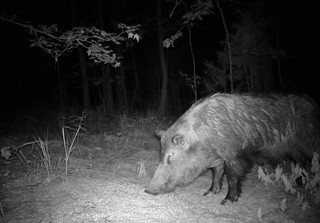U.S. Department of Agriculture seeking input on feral swine in Arkansas
PINE BLUFF, Ark. – In February Arkansas small farmers and ranchers should expect to receive a questionnaire in the mail from the National Agriculture Statistics Service seeking their opinions on feral swine in Arkansas, said David Fernandez, Cooperative Extension Program livestock specialist at the University of Arkansas at Pine Bluff.

The U.S. Department of Agriculture wants to know if feral swine are a problem or an opportunity, and whether they cause financial losses or generate welcome income from hunting and other activities, he said. USDA is interested in hearing from small farmers and ranchers on the impact of feral swine on their operations.
“In the early 1980s, feral swine or wild pigs were confined almost exclusively to Florida and Texas. Since then they have spread across most of the South and are now present in 40 states,” Fernandez said. Their spread across most of the nation has brought them to the attention of the USDA.
Information gathered in the survey will be used by USDA to decide whether or not to initiate a feral swine control program. It will also be used to help decide how to go about instituting such a program should one be created.
The Cooperative Extension Program at the University of Arkansas at Pine Bluff is cooperating with other universities across the South to get the opinions of small farmers and ranchers on the impact of feral swine in Arkansas.
All information gathered will be submitted anonymously. The first round of surveys will focus on the impact of feral swine on corn, wheat, soybeans, rice and grain sorghum. Later surveys may focus on vegetables and livestock production.

For more information about this or other livestock-related problems, contact Dr. Fernandez at (870) 575-7214 or fernandezd@uapb.edu or (870) 575-7214.
Pursuant to 7 CFR § 15.3, the University of Arkansas System Division of Agriculture offers all its Extension and Research programs and services (including employment) without regard to race, color, sex, national origin, religion, age, disability, marital or veteran status, genetic information, sexual preference, pregnancy or any other legally protected status, and is an equal opportunity institution.
# # #
Media Contact:
Carol Sanders
(870) 575-7238
sandersc@uapb.edu
UAPB School of Agriculture, Fisheries and Human Sciences
Related Links